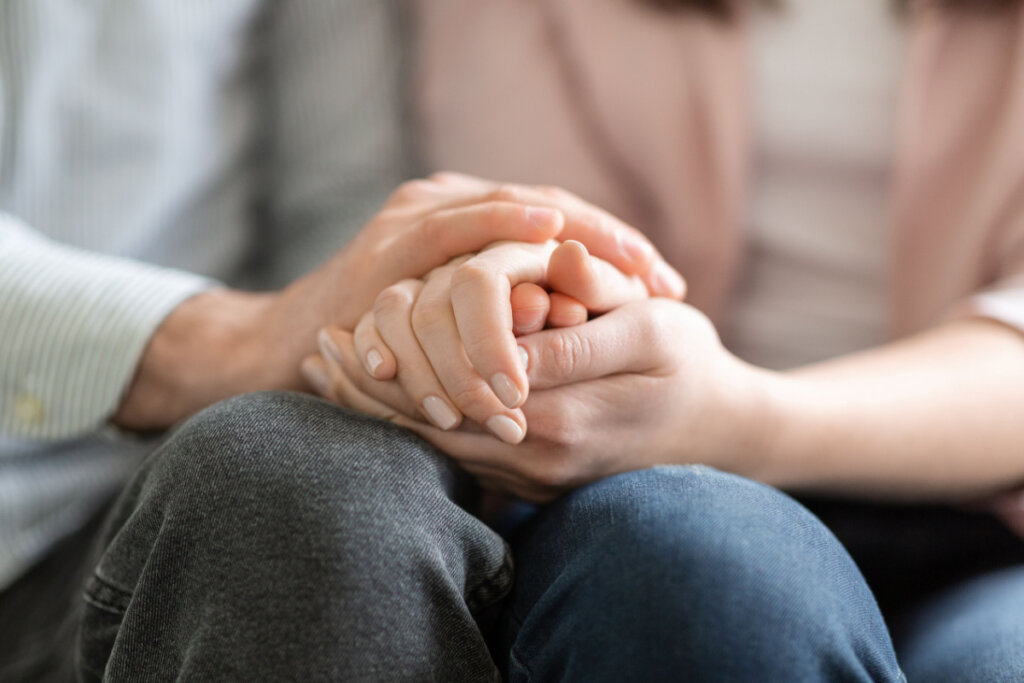Are We Programmed to Love?


Written and verified by the psychologist Valeria Sabater
They say that love makes us act like fools. Indeed, sometimes, we fall in love with those we shouldn’t. Or, we have love affairs that only last a moment. And sometimes, we fall into the painful trap of unrequited love. Moreover, some people feel so exhausted by their numerous disappointments, wounds, and setbacks that they vow never to love again and close the doors of their hearts forever.
However, it’s obvious that love flourishes in the brain. As such, it has a sociobiological purpose. And, we’re not only talking about reproductive purposes to promote the continuity of our species. As a matter of fact, affection manifests itself in many ways, not just through the classic bond of passion between a couple.
To love is the verb that we conjugate the most throughout our existence and in the most diverse ways. If we feel this deep, enriching, and healthy emotion, it’s due to a series of reasons that are worth understanding.
We’re programmed to build attachment relationships with other figures. They guarantee our survival and well-being.

We’re programmed to love
Understanding the mechanisms of love in the brain allows us to better understand ourselves as a species. For example, it helps us understand why we feel so full of energy when we’re infatuated or why betrayal hurts so much. Also, why growing up in dysfunctional and unaffectionate families can have consequences for our mental health.
Loving and being loved (whether by partners, friends, or families) is a biological need, like hunger or thirst. However, our need for survival exceeds the need for connection. Therefore, staying alive and preserving existence is usually the main objective of the human brain.
Stephanie Cacioppo, a psychiatrist specializing in behavioral sciences, wrote the book, Wired for Love: A Neuroscientist’s Journey Through Romance. In it, she claims that not only are we ‘programmed’ to love, but this emotion is a requirement that gives purpose and meaning to us all.
Love motivates us to need care and protection. Our brains activate up to 12 regions when we experience this instinctive emotion.
Attachment: a fundamental need
Our survival depends largely on attachment and the ability to bond with each other. Attachment, in the fields of psychology and ethology, defines the affective bond based on mutual care, affection, and protection. This experience doesn’t only appear between a child and their parents. It also develops between couples and even in friendships.
Having a series of significant figures in our lives reduces stress and builds our sense of belonging. We feel part of others when we have the kinds of relationships in which not only affection flows, but learning and experience also give us wisdom. In fact, love, in any of its forms, implies care and respect. These are two essential pillars of the social brain.
Relationships give us meaning and purpose
In her book, Dr. Cacioppo makes a claim that’s also mentioned in a study conducted by the University of Syracuse (USA). They both propose that love activates the dopaminergic reward circuit in the brain. It also increases the release of oxytocin, serotonin, and adrenaline. This torrent of neurotransmitters activates up to twelve brain regions, generating multiple needs, motivations, and sensations in us.
Yet, those complex neurobiological mechanisms that orchestrate love are also meant to give us purpose. The affection of partners and our families gives meaning to our existence, as do friendships. Indeed, this deep and multifaceted emotion is the social glue that motivates us, invites us to set goals, and remember why it’s worth getting up every morning.
A social contract that improves us as human beings
We’re programmed to love, not just to feel protected or to build vital meanings. In fact, love, in all its forms, is also a form of social contract. Couples, families, and even groups of friends are like mini-partnerships.
They’re the kinds of links that, in order to be successful and satisfying, must be based on equity, justice, and care. Loving, wanting, or feeling affection for our significant others means we collaborate with them on a daily basis. This unconscious contract allows us to solve problems and challenges, share child-rearing, find economic support, and even build our social images.
Who we are is linked to the people with whom we interact on a daily basis. Loving each other and caring for our loved ones forms exceptional support. It allows us to navigate society with greater security and well-being. This support acts as a mooring, encouraging us to progress in environments that are almost always complex.
We all need to feel cared loved, cared for, and respected. This affective conjunction makes it easier for us to evolve as social beings.

Deserving love
You might wonder why we don’t always manage to get people to love us in the way we deserve. In fact, this is the greatest distortion in our psycho-emotional fabric. It’s both an irony and a tremendous tragedy. We’re programmed to love, but sometimes we’re loved badly.
What can you do if you find yourself in this kind of situation? Ideally, you should remember that, despite your bad experiences, you shouldn’t give up on love. For instance, if you had a bad childhood due to a dysfunctional family, it doesn’t have to govern your existence. Or, a painful relationship doesn’t mean you have to shut the door to ever falling in love again.
Don’t close the door of your heart. Remember, there are many forms of affection. Good friends can also form the daily support so necessary for your well-being. As Shakespeare said, “Love comforteth like sunshine after rain”. Don’t run away from it.
They say that love makes us act like fools. Indeed, sometimes, we fall in love with those we shouldn’t. Or, we have love affairs that only last a moment. And sometimes, we fall into the painful trap of unrequited love. Moreover, some people feel so exhausted by their numerous disappointments, wounds, and setbacks that they vow never to love again and close the doors of their hearts forever.
However, it’s obvious that love flourishes in the brain. As such, it has a sociobiological purpose. And, we’re not only talking about reproductive purposes to promote the continuity of our species. As a matter of fact, affection manifests itself in many ways, not just through the classic bond of passion between a couple.
To love is the verb that we conjugate the most throughout our existence and in the most diverse ways. If we feel this deep, enriching, and healthy emotion, it’s due to a series of reasons that are worth understanding.
We’re programmed to build attachment relationships with other figures. They guarantee our survival and well-being.

We’re programmed to love
Understanding the mechanisms of love in the brain allows us to better understand ourselves as a species. For example, it helps us understand why we feel so full of energy when we’re infatuated or why betrayal hurts so much. Also, why growing up in dysfunctional and unaffectionate families can have consequences for our mental health.
Loving and being loved (whether by partners, friends, or families) is a biological need, like hunger or thirst. However, our need for survival exceeds the need for connection. Therefore, staying alive and preserving existence is usually the main objective of the human brain.
Stephanie Cacioppo, a psychiatrist specializing in behavioral sciences, wrote the book, Wired for Love: A Neuroscientist’s Journey Through Romance. In it, she claims that not only are we ‘programmed’ to love, but this emotion is a requirement that gives purpose and meaning to us all.
Love motivates us to need care and protection. Our brains activate up to 12 regions when we experience this instinctive emotion.
Attachment: a fundamental need
Our survival depends largely on attachment and the ability to bond with each other. Attachment, in the fields of psychology and ethology, defines the affective bond based on mutual care, affection, and protection. This experience doesn’t only appear between a child and their parents. It also develops between couples and even in friendships.
Having a series of significant figures in our lives reduces stress and builds our sense of belonging. We feel part of others when we have the kinds of relationships in which not only affection flows, but learning and experience also give us wisdom. In fact, love, in any of its forms, implies care and respect. These are two essential pillars of the social brain.
Relationships give us meaning and purpose
In her book, Dr. Cacioppo makes a claim that’s also mentioned in a study conducted by the University of Syracuse (USA). They both propose that love activates the dopaminergic reward circuit in the brain. It also increases the release of oxytocin, serotonin, and adrenaline. This torrent of neurotransmitters activates up to twelve brain regions, generating multiple needs, motivations, and sensations in us.
Yet, those complex neurobiological mechanisms that orchestrate love are also meant to give us purpose. The affection of partners and our families gives meaning to our existence, as do friendships. Indeed, this deep and multifaceted emotion is the social glue that motivates us, invites us to set goals, and remember why it’s worth getting up every morning.
A social contract that improves us as human beings
We’re programmed to love, not just to feel protected or to build vital meanings. In fact, love, in all its forms, is also a form of social contract. Couples, families, and even groups of friends are like mini-partnerships.
They’re the kinds of links that, in order to be successful and satisfying, must be based on equity, justice, and care. Loving, wanting, or feeling affection for our significant others means we collaborate with them on a daily basis. This unconscious contract allows us to solve problems and challenges, share child-rearing, find economic support, and even build our social images.
Who we are is linked to the people with whom we interact on a daily basis. Loving each other and caring for our loved ones forms exceptional support. It allows us to navigate society with greater security and well-being. This support acts as a mooring, encouraging us to progress in environments that are almost always complex.
We all need to feel cared loved, cared for, and respected. This affective conjunction makes it easier for us to evolve as social beings.

Deserving love
You might wonder why we don’t always manage to get people to love us in the way we deserve. In fact, this is the greatest distortion in our psycho-emotional fabric. It’s both an irony and a tremendous tragedy. We’re programmed to love, but sometimes we’re loved badly.
What can you do if you find yourself in this kind of situation? Ideally, you should remember that, despite your bad experiences, you shouldn’t give up on love. For instance, if you had a bad childhood due to a dysfunctional family, it doesn’t have to govern your existence. Or, a painful relationship doesn’t mean you have to shut the door to ever falling in love again.
Don’t close the door of your heart. Remember, there are many forms of affection. Good friends can also form the daily support so necessary for your well-being. As Shakespeare said, “Love comforteth like sunshine after rain”. Don’t run away from it.
All cited sources were thoroughly reviewed by our team to ensure their quality, reliability, currency, and validity. The bibliography of this article was considered reliable and of academic or scientific accuracy.
- Beauregard M, Courtemanche J, Paquette V, St-Pierre EL. The neural basis of unconditional love. Psychiatry Res. 2009 May 15;172(2):93-8. doi: 10.1016/j.pscychresns.2008.11.003. Epub 2009 Mar 25. PMID: 19321316.
- Cacciopo, Stephanie (2022) Wired for Love:A Neuroscientist’s Journey Through Romance. Robinson
- Ortigue S, Bianchi-Demicheli F, Patel N, Frum C, Lewis JW. Neuroimaging of love: fMRI meta-analysis evidence toward new perspectives in sexual medicine. J Sex Med. 2010 Nov;7(11):3541-52. doi: 10.1111/j.1743-6109.2010.01999.x. Epub 2010 Aug 30. PMID: 20807326.
- Zablocki-Thomas PB, Rogers FD, Bales KL. Neuroimaging of human and non-human animal emotion and affect in the context of social relationships. Front Behav Neurosci. 2022 Oct 21;16:994504. doi: 10.3389/fnbeh.2022.994504. PMID: 36338883; PMCID: PMC9633678.
This text is provided for informational purposes only and does not replace consultation with a professional. If in doubt, consult your specialist.







